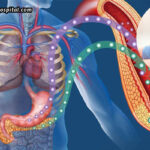Stress is an inevitable part of life, affecting everyone, but varying degrees of stress affects each person differently. Although the consequences of stress on mental health are widely recognized, stress also has a significant influence on physical health, especially gut health. An important part of this link is the gut-brain axis, a bidirectional communication mechanism between the stomach and the brain. To lessen these negative effects and enhance general wellbeing, it might be helpful to understand how stress affects the digestive system and acquire practical stress management techniques. This in-depth manual will examine how stress affects intestinal health and offer doable stress-reduction techniques.
How stress affects the gut
The “fight or flight” response is a set of physiological reactions that the body experiences in response to stress. This reaction may have a major effect on the digestive system.
- Modified gut motility: Stress can cause modifications in the motility of the gut, which can result in symptoms such as constipation, diarrhoea, or both.
- Increased gut permeability: Stress has been linked to an increase in intestinal permeability, which makes it possible for dangerous chemicals to enter the circulation and cause inflammation.
- Alterations in the gut microbiota: Stress has the power to upset the equilibrium of the gut microbiota, decreasing the number of good bacteria and encouraging the growth of bad ones.
- Enhanced sensitivity: Stress can increase the gut’s sensitivity, which makes it more aware of pain and discomfort. This is frequently observed in disorders like irritable bowel syndrome (IBS).
Digestive problems associated with stress
Stress has a major negative effect on digestive health and can lead to conditions including ulcers, GERD, and IBS. Comprehending the connection between stress and digestion is essential for efficient handling and enhanced overall health.
- Gastroesophageal Reflux Disease (GERD): Stress can make symptoms of gastroesophageal reflux disease worse by raising the production of stomach acid and relaxing the lower oesophageal sphincter (LES), which lets acid reflux back into the oesophagus.
- Irritable Bowel Syndrome (IBS): The symptoms of Irritable Bowel Syndrome (IBS), a functional gastrointestinal illness, include bloating, changed bowel habits, and abdominal discomfort. Stress management is essential for symptom reduction as stress is a major cause for IBS flare-ups.
- Inflammatory Bowel Disease (IBD): Chronic inflammation of the digestive system is the hallmark of inflammatory bowel disease (IBD), an autoimmune disorder that also encompasses ulcerative colitis and Crohn’s disease. Stress can exacerbate the symptoms and cause flare-ups.
- Peptic ulcers: Stress can exacerbate peptic ulcers by raising stomach acid production and decreasing the mucus lining that protects the stomach, even though Helicobacter pylori infection and NSAID usage are the main causes of the disorder.
Strategies for stress management
Managing stress efficiently is essential to enhancing general health and wellbeing. Learn stress-reduction techniques that will improve your quality of life, such as mindfulness, consistent exercise, a balanced diet, and enough sleep.
- Limiting Stressors: Your ability to manage stress can be greatly enhanced by identifying and reducing the stressors in your life. This might be establishing limits at work, assigning responsibilities, or making time for enjoyable pastimes and unwinding pursuits.
- Balanced Diet: Consuming a well-balanced diet full of fruits, vegetables, lean meats, healthy fats, and fibre can help maintain gut health and increase resilience to stress. Reducing stress-related digestive problems can also be achieved by avoiding processed meals, alcohol, and excessive coffee.
- Adequate Sleep: Getting enough sleep is crucial for both general health and stress management. Aim for seven to nine hours of sleep per night and follow a regular sleep routine. The quality of your sleep may be enhanced by good sleep hygiene habits including establishing a calming nighttime routine and reducing screen time before bed.
- Mindfulness and Meditation: By encouraging relaxation and enhancing emotional control, mindfulness and meditation practices can help lower stress levels. Particularly useful methods include guided visualization, body scans, and focused breathing.
- Physical Activity: Frequent exercise is an effective way to reduce stress. Exercise causes the body to produce endorphins, which are naturally occurring chemicals that improve mood. Exercises like yoga, tai chi, walking, and jogging can help lower stress and promote intestinal health.
- Relaxation Techniques: Stress management may be achieved by incorporating relaxation methods into your everyday practice. Stress reduction and relaxation can be achieved by methods including aromatherapy, deep breathing exercises, and progressive muscle relaxation.
- Cognitive Behavioural Therapy (CBT): CBT is a type of psychotherapy that assists patients in recognizing and altering unfavourable thinking patterns and behavioural patterns. By treating the psychological components of digestive diseases, it can be especially useful for stress management and gut health improvement.
When to seek professional help
Although stress reduction techniques and self-care can significantly improve digestive health, it’s crucial to get medical attention if you have severe or enduring symptoms. A medical professional may assist in determining the root reasons and offering proper therapy. In many instances, addressing the intricate relationship between stress and digestive health may need collaboration between a gastroenterologist and a mental health specialist. Mission Gastro Hospital provides comprehensive gastro disease care Ahmedabad for a range of gastrointestinal disorders. With a group of knowledgeable gastroenterologists and cutting-edge equipment, Mission Gastro offers tailored treatment programmes catered to each patient’s individual need. Take action to improve your digestive health and general well-being by seeking professional care and refusing to allow stress and digestive problems rule your life. Whether you want assistance in controlling digestive issues, GERD, or other diseases, Mission Gastro Hospital is committed to giving its patients the finest possible results. Make your health a priority and seek advice from professionals for effective and compassionate care.








